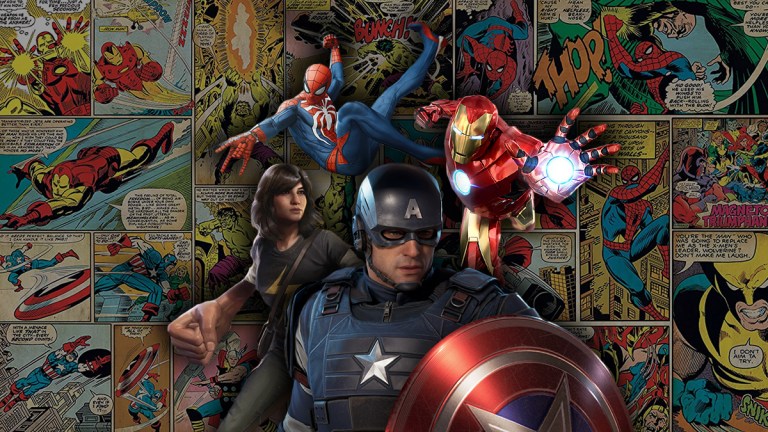How Marvel’s Avengers and Spider-Man Are Shaping the Superhero Games of Tomorrow
Marvel's Bill Rosemann on how Marvel's Spider-Man, Marvel's Avengers, and Marvel's Iron Man VR are changing storytelling in the superhero game genre.

Since the 1960s, the best Marvel stories have appeared almost exclusively in comic books and, more recently, on the big screen. But Bill Rosemann, Vice President and Head of Creative at Marvel Games, has made it his mission to work with some of the best development studios in the world to tell great Marvel stories in video game form.
“Storytelling is at the heart of everything we do at Marvel, and that includes games,” says Rosemann. “Historically, what’s made Marvel stand out is that there is reasoning and complexity to the adventures. When Stan Lee said, ‘We’re going to put the “human” in “superhuman,”’ that applied not only to the characters but to the types of stories they were featured in.”
The team at Marvel Games was rebuilt about five years ago by Head of Marvel Games Jay Ong, who refocused the division as a pillar of Marvel storytelling alongside books and movies. “One of our guiding principles was that Marvel Games was no longer going to make games that are in support of something else,” Rosemann says. “Games should be respected for what they are—we can’t make a game that’s trying to adapt a movie, TV show, or comic book. Our team should tell our own unique stories. Our proof of that was Marvel’s Spider-Man.”
That game, developed by Insomniac Games, garnered high praise from both critics and fans, selling 3.3 million units in three days and earning multiple game-of-the-year awards and nominations. In Rosemann’s eyes, that success can be attributed to Insomniac Games and Marvel Games’ commitment to identifying what makes Spider-Man stories special.
“The best Spider-Man stories are when the people in his civilian life are threatened by things that happen in his superhero life. Spider-Man isn’t just fighting someone to punch them—he’s defending a loved one. We applied that idea of worlds colliding to every single character in the game.”
One of those characters is Mary Jane Watson, who has a much different arc in the game than in the comics or movies. “We wanted to make sure that Mary Jane was the hero of her own story,” Rosemann explains. “In the comics, she had run night clubs and been an actress, and that’s a little difficult to relate to. We thought, what if we made her a reporter for the Daily Bugle? It had never been done before, but it felt right. It gave her a reason to be in these dangerous situations, and it fed into the worlds-collide storytelling.”
In addition to its rich characterization, Marvel’s Spider-Man also played with themes in ways previously unheard of in Marvel games. According to Rosemann, one of the game’s central themes can be found in Peter’s complicated relationship with Otto Octavius.
“They’re essentially the very same character,” he says. “Both of them were underdogs, both of them were outsiders, both of them loved science. Then, they both had science accidents and received powers. Peter realized he had to use his powers responsibly and selflessly. Otto decides to be selfish. Most of Marvel’s best heroes and villains are reflections of one another. It comes down not to the powers they have, but what they do with those powers.”
There’s a thoughtfulness to the way Marvel Games and its collaborators approach storytelling. It’s a long, methodical creative process, but one that the team hopes results in stories that can stand up to the harsh scrutiny of even the most passionate Marvel fans.
“You start by talking about who these characters are as people and what has shaped them into who they are,” Rosemann says. “And then you start talking about what their goals are. You have a protagonist who has a goal and an antagonist who has a goal, and those goals collide. Character drives action, action drives plot, and it all goes hand-in-hand. It’s cool to see individuals in cool costumes with amazing powers clash, but if they don’t have motivations that are relatable, you might as well be throwing two action figures together.”
Currently, Rosemann is hard at work on Marvel’s Avengers, which is being developed by Crystal Dynamics and Eidos Montreal at Square Enix. The game is a new adventure starring Captain America, Black Widow, Iron Man, Thor, The Hulk, and Ms. Marvel. Marvel’s Avengers is set in its own timeline in which Earth’s Mightiest Heroes disbanded and a militaristic and technologically- advanced faction known as A.I.M. is now policing the streets.
“Once we settled on who our core Avengers would be, we asked, ‘what’s at the core of each of these characters?’” Rosemann explains. “At Marvel, we always think about who the characters were before they got their powers. What were the guiding forces in their lives? What is their personality? What are the decisions they make that make them a hero?”
Marvel’s Avengers looks to be one of the most complex superhero stories ever told in video game form. The game predominantly takes place five years after a catastrophic event in San Francisco called “A-Day,” which results in the apparent death of Captain America, a big narrative decision that sets the tone for a story that, according to Rosemann, is largely defined by repentance and regret. Every Avenger is forced to reckon with a past failure.
“Tony Stark is trying to make up for the fact that he used to make weapons of mass destruction. Bruce Banner is trying to make up for the fact that he himself can be a weapon of mass destruction. Natasha is trying to make up for being an assassin for the Russian government. Even Steve Rogers feels he was a failure in his last mission in World War II because Bucky died. A-Day stirs up these feelings of guilt and remorse and recrimination, and that’s what drives the story.”
With each new project, Marvel Games is building a new legacy, harnessing the power of video games to tell stories in a way that comics and movies simply can’t. Games can offer a unique sense of agency and immersion, and more than ever before, Marvel games are taking advantage of these tools. The Camouflaj-developed Marvel’s Iron Man VR immerses players in the world of Tony Stark in a way that, according to Rosemann, won’t be limited to aerial action. “When you play the game, you must make decisions as Tony both in and out of the armor.”
Video games are constantly evolving as a narrative platform, offering new ways for creators to tell their stories with each leap forward in technology. It’s a bleeding-edge medium, though Rosemann actually views tech innovations in video games as opportunities for players to connect more intimately with classic moments from Marvel’s past.
“When you read a comic, there is interaction, but video games take it a step further,” Rosemann says. “You’re put in the heroes’ shoes, so the feeling is more visceral.” Rosemann recalls going back to a famous moment from Amazing Spider-Man #33 where Spidey is trapped under rubble and thinks he’s going to die. “We paid tribute to the scene in Marvel’s Spider-Man. When Peter lifts that rubble off of himself or off of others, it’s about redemption. That’s something we can all relate to, and video games provide a cathartic outlet to experience those successes.”
Ultimately, Rosemann’s job is to imbue the different studios working on Marvel games with the principles that Stan Lee, Jack Kirby, Steve Ditko, and their contemporaries embedded in the DNA of Marvel Comics. No quote sums up what classic Marvel storytelling is all about better than “With great power comes great responsibility,” and Rosemann invokes that now-legendary Spider-Man proverb when characterizing Marvel Games’ ultimate mission.
“Our power is: we’ve gotten to work with these great characters and creators, and have the support of Marvel,” Rosemann says. “Our responsibility is to deliver the best video games and empower all of our collaborators to tell their own stories and deliver a generation of games that can be looked back on as a golden era of Marvel Games. Our stories in games should be strong enough to stand alongside the best Marvel stories, no matter the medium. That’s our goal.”
